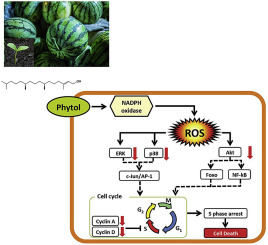Food and Chemical Toxicology ( IF 3.9 ) Pub Date : 2018-03-30 , DOI: 10.1016/j.fct.2018.03.033 Tomohiro Itoh , Akito Ono , Kaori Kawaguchi , Sayaka Teraoka , Mayo Harada , Keitaro Sumi , Masashi Ando , Yasuyuki Tsukamasa , Masayuki Ninomiya , Mamoru Koketsu , Toshiharu Hashizume

|
The phytol isolated from watermelon (Citrullus lanatus) sprouts inhibited the growth of a human T-cell leukemia line Jurkat cell and suppressed tumor progression in a xenograft model of human lung adenocarcinoma epithelial cell line A549 in nude mice. To elucidate the mechanisms underlying the phytol-induced cell death in the present study, we examined the changes in cell morphology, DNA fragmentation, and intracellular reactive oxygen species (ROS) levels and performed flow cytometric analysis to evaluate cell cycle stage. There were no significant changes in apoptosis, autophagy, and necrosis marker in cells treated with the phytol. But, we found, for the first time, that phytol remarkably induced S-phase cell cycle arrest accompanied with intracellular ROS production. Western blot analyses showed that phytolinduced S-phase cell cycle arrest was mediated through the decreased expression of cyclins A and D and the downregulations of MAPK and PI3K/Akt. The tumor volume levels in mice treated with phytol were lower than those of non-treatment groups, and it showed very similar suppression compared with those of mice treated with cyclophosphamide. Based on the data of in vitro and in vivo studies and previous studies, we suggest phytol as a potential therapeutic compound for cancer.
中文翻译:

从西瓜(Citrullus lanatus)芽中分离出的植物醇通过S期细胞周期停滞诱导人T淋巴细胞系Jurkat细胞死亡
从西瓜(分离的植醇西瓜)在裸鼠的人肺腺癌上皮细胞系A549的异种移植模型中,新芽抑制了人T细胞白血病系Jurkat细胞的生长并抑制了肿瘤的进展。为了阐明本研究中植醇诱导的细胞死亡的潜在机制,我们检查了细胞形态,DNA片段化和细胞内活性氧(ROS)水平的变化,并进行了流式细胞仪分析以评估细胞周期阶段。用植醇处理的细胞的凋亡,自噬和坏死标记无明显变化。但是,我们首次发现植醇显着诱导S期细胞周期停滞并伴有细胞内ROS的产生。蛋白质印迹分析表明,植酸诱导的S期细胞周期阻滞是通过细胞周期蛋白A和D的表达减少以及MAPK和PI3K / Akt的下调来介导的。用植醇处理的小鼠的肿瘤体积水平低于未处理组的肿瘤体积水平,与用环磷酰胺治疗的小鼠相比,其显示出非常相似的抑制作用。根据体外数据和在体内研究和以前的研究中,我们建议将植醇作为潜在的癌症治疗化合物。































 京公网安备 11010802027423号
京公网安备 11010802027423号